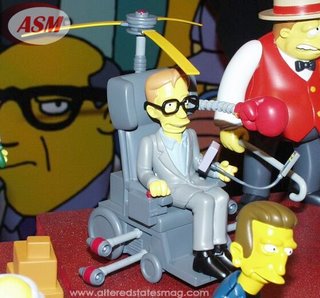Belated blogging against bad stuff
 As I mentioned on Tuesday, Monday was not only International Workers Day, but also Blog Against Disablism Day. While I missed the day itself I did say I'd write something and genuinely intended to. Unfortunately it's now almost a week later and I still haven't written anything. This isn't because I've changed my mind about doing so or because I've been particularly busy, but rather because I couldn't think of anything much to say. I have felt for sometime that disabled rights is an important issue and one which receives insuffficient attention from most activists, lefties and anarchists. However, as an able-bodied, white, fairly middle-class, male with little experience of oppression how am I to discuss such issues without resorting to vacuous platitudes?
As I mentioned on Tuesday, Monday was not only International Workers Day, but also Blog Against Disablism Day. While I missed the day itself I did say I'd write something and genuinely intended to. Unfortunately it's now almost a week later and I still haven't written anything. This isn't because I've changed my mind about doing so or because I've been particularly busy, but rather because I couldn't think of anything much to say. I have felt for sometime that disabled rights is an important issue and one which receives insuffficient attention from most activists, lefties and anarchists. However, as an able-bodied, white, fairly middle-class, male with little experience of oppression how am I to discuss such issues without resorting to vacuous platitudes? Making my way through the plethora of posts written as part of the day, I found one piece on the Memory Hole which raised many of the questions I had been ruminating on. Cassandra05 also pointed to an article by occasional Disillusioned kid comrade Alex Doherty who by way of a convoluted introduction quoted feminist Andrea Dworkin on a discussion she had once had with her father on the subject of racism:
Making my way through the plethora of posts written as part of the day, I found one piece on the Memory Hole which raised many of the questions I had been ruminating on. Cassandra05 also pointed to an article by occasional Disillusioned kid comrade Alex Doherty who by way of a convoluted introduction quoted feminist Andrea Dworkin on a discussion she had once had with her father on the subject of racism:He told me he had racist feelings against blacks. I said that was impossible because he was for civil rights. He explained the kinds of feelings he had and why they were wrong. He also explained that as a teacher and then later as a guidance counsellor he worked with black children and he had to make sure his racist feelings didn’t harm them. From my father I learned that having these feelings didn’t justify them; that “good” people had bad feelings and that didn’t make the feelings any less bad; that dealing with racism was a process, something a person tangled with actively. The feelings were wrong and a “good” person took responsibility for facing them down.This, Alex suggests, is in all likelihood a common reality amongst those fighting the good fight, but one all to rarely admitted. "Most of us, (myself included), too often take the line of the young Dworkin- 'since I am for civil rights I therefore cannot have racist feelings.' Or 'since I am pro-feminist I therefore cannot have sexist tendencies' According to this conception prejudice is not an emotional or an institutional issue but rather a logical one."
 I have encountered some evidence of this in my travels through the activist milieu and it is perhaps of value to consider at least one example briefly. It would appear to be axiomatic that the consumate anarchist is opposed to patriarchy and finding one who'll admit to being sexist is like looking for a Catholic who doesn't believe in God. Nevertheless, when males decide one day to describe themselves as "anarchists" that doesn't mean on that day they suddenly lose any sexist prejudices or stop benefiting from the privileges with which patriarchy furnishes us. All too often we bring these things with us into the anarchist tent where they proceed to piss the hell out of any women who have the misfortune of getting trodden on as we rush to profess our revolutionary purity. When I was involved in Lenton Anarchist Forum (before the inevitable split and my decision to establish my own faction here in Essex) it was notable that discussions would all too often be dominated by males, even where they had little or nothing of value to contribute. As you may have guessed given my tendency to go on at length about whatever's getting my goat up this week, more often than not, I was among the guilty parties. This is not something I'm proud of and I should have done more to rectify the situation - which I was aware of even at the time - but to admit that I was in the wrong is a crucial first step.
I have encountered some evidence of this in my travels through the activist milieu and it is perhaps of value to consider at least one example briefly. It would appear to be axiomatic that the consumate anarchist is opposed to patriarchy and finding one who'll admit to being sexist is like looking for a Catholic who doesn't believe in God. Nevertheless, when males decide one day to describe themselves as "anarchists" that doesn't mean on that day they suddenly lose any sexist prejudices or stop benefiting from the privileges with which patriarchy furnishes us. All too often we bring these things with us into the anarchist tent where they proceed to piss the hell out of any women who have the misfortune of getting trodden on as we rush to profess our revolutionary purity. When I was involved in Lenton Anarchist Forum (before the inevitable split and my decision to establish my own faction here in Essex) it was notable that discussions would all too often be dominated by males, even where they had little or nothing of value to contribute. As you may have guessed given my tendency to go on at length about whatever's getting my goat up this week, more often than not, I was among the guilty parties. This is not something I'm proud of and I should have done more to rectify the situation - which I was aware of even at the time - but to admit that I was in the wrong is a crucial first step.(There's much more to be said on this particular point which is of particular interest - for obvious reasons - to anarcha-feminists. Although not specifically anarchist-related, I'd like to humbly suggest you make a point of checking out this post by Chris Clarke in which he explains why he is not a feminist - or this one by Twisty Faster, whence the Clarke link originates, in which she ruminates about whether "Liberal White Dudes" can be feminists.)
 Hopefully the application of this argument to disablism should be obvious. The mere fact that I assert my oposition to discrimination against those classified as "disabled" - which I do unequivocably - does not mean that I haven't been guilty of such discrimination at times. I am very aware that when I am around disabled people I am always very concious of that fact. No doubt I act differently around them. While I would never be deliberately offensive or anything so crude it is entirely possible that my differential response does impact upon its subject. At times it may even be tempting to remove myself from the situation. None of this is commendable and I do not publish any of this in pursuit of your sympathy. Far from it.
Hopefully the application of this argument to disablism should be obvious. The mere fact that I assert my oposition to discrimination against those classified as "disabled" - which I do unequivocably - does not mean that I haven't been guilty of such discrimination at times. I am very aware that when I am around disabled people I am always very concious of that fact. No doubt I act differently around them. While I would never be deliberately offensive or anything so crude it is entirely possible that my differential response does impact upon its subject. At times it may even be tempting to remove myself from the situation. None of this is commendable and I do not publish any of this in pursuit of your sympathy. Far from it.Intriguingly, Pacian suggests in his magisterial post on discrimination against those with hearing difficulties that even suffering from a disability yourself doesn't preclude the possibility of you discriminating against somebody with a different disability. This shouldn't be all that surprising. We are familiar with analagous examples, such those who have suffered racism exhibiting it towards those from other racial groups. One thinks of the apparently racially motivated firebombings of asian businesses which appear to have been carried out by a black man. Somebody more relaxed about controversy than I might also point to the Jewish diaspora's generations long sufferance of anti-Semitism and draw paralells with Israeli treatment of the Palestinians.
 Doubtless, the foregoing may appear pessimistic even depressing, but this needn't neccesarily be the case. We may not completely have thrown off the chains of patriarchy, but women have won many rights and achieved freedoms which previous generations could only dream of. Ditto racism. It may not be gone entirely - as the apparent upsurge in supoort for the fascist bottom feeders of the BNP demonstrates - but again we've come a long way. Witness the demise of the Black and White Minstrels and the palimpsest of statutory regulation on the matter (as superficial as much of that is).
Doubtless, the foregoing may appear pessimistic even depressing, but this needn't neccesarily be the case. We may not completely have thrown off the chains of patriarchy, but women have won many rights and achieved freedoms which previous generations could only dream of. Ditto racism. It may not be gone entirely - as the apparent upsurge in supoort for the fascist bottom feeders of the BNP demonstrates - but again we've come a long way. Witness the demise of the Black and White Minstrels and the palimpsest of statutory regulation on the matter (as superficial as much of that is)."So," you may be thinking, "The kid makes a compelling case for the possibility of change, but how, pray, does one go about achieving such a transformation in attitudes?" Well, obviously there aren't any easy answers, but I would suggest that one of the best ways to overcome prejudice is through common struggle. Some of my Trot friends like to tell a story about the Miners' Strike. The imaginatively titled Yorkshire Miner was a monthly journal produced by the National Union of Mineworkers (NUM). By all accounts this was an important, militant journal which played an important role in the organisation of the strike. It supplemented it's political analysis and calls to action with its very own "Page Three Stunner." In each edition, the wife or girlfriend of some lucky miner would be pictured wearing not-much-at-all with an accompanying suggestive caption. (At least they didn't go the way of today's Sun and start attributing facile commentary on newsworthy events to the young ladies).
 There had been a campaign for some years to get this out of the paper, although it met with little success. NUM big cheese Arthur Scargill even went on TV to defend the feature. He opined that the images were a way to get miners to read the rest of the paper and dismissed the controversy as "a storm in a B-cup". When the strike got underway, women played a crucial role, with miners' wives being particularly prominent. This clearly opened Scargill's eyes and at a major demonstration organised by miners' wives, he announced that he'd been wrong about the slot. Women weren't just eye candy for male union members and were in fact class warriors in their own right. Furthermore, he promised that the page three feature would be abolished immediately. As you might expect the women in attendance were delighted, but the important thing is that the thousands of male unionists applauded along with their wives, daughters, sisters and mothers. Objectification had been replaced with solidarity.
There had been a campaign for some years to get this out of the paper, although it met with little success. NUM big cheese Arthur Scargill even went on TV to defend the feature. He opined that the images were a way to get miners to read the rest of the paper and dismissed the controversy as "a storm in a B-cup". When the strike got underway, women played a crucial role, with miners' wives being particularly prominent. This clearly opened Scargill's eyes and at a major demonstration organised by miners' wives, he announced that he'd been wrong about the slot. Women weren't just eye candy for male union members and were in fact class warriors in their own right. Furthermore, he promised that the page three feature would be abolished immediately. As you might expect the women in attendance were delighted, but the important thing is that the thousands of male unionists applauded along with their wives, daughters, sisters and mothers. Objectification had been replaced with solidarity.Fortunately, Arthur Scargill is no longer a major player in radical politics, but the general point is hopefully obvious. Here endeth todays lesson.
File Under: Blog Against Disablism Day, Disability



















<< Home